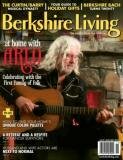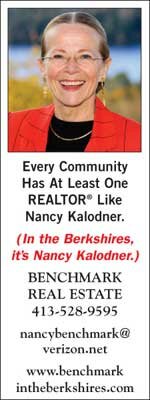Star Struck
 At first glance, Susan Herskowitz could easily pass for a Madison Avenue executive or financial advisor. She answers the door to her home in Great Barrington, Massachusetts, sporting trendy tortoise-shell eyeglasses that tuck a honey-colored lock of hair swept to one side, wearing stylish jeans paired with a crisp, salmon-pink button-down shirt, and exhibiting the laser-focused demeanor more typical of a corporate manager than a connoisseur of astrology.
At first glance, Susan Herskowitz could easily pass for a Madison Avenue executive or financial advisor. She answers the door to her home in Great Barrington, Massachusetts, sporting trendy tortoise-shell eyeglasses that tuck a honey-colored lock of hair swept to one side, wearing stylish jeans paired with a crisp, salmon-pink button-down shirt, and exhibiting the laser-focused demeanor more typical of a corporate manager than a connoisseur of astrology.
Make no mistake, she says in a firm and grounded tone: “There’s nothing ‘woo-woo’ about what I do.”
Seated comfortably in her bookshelf-lined contemporary home office, Herskowitz presents an astrological chart marked with multicolored diagonal lines and triangular shapes, representing a map of the sky at the time of one’s birth. A personal chart, she explains, shows the “the essence of a person,” which can illuminate potentials and pitfalls and serve as a tool for personal growth.
“If you look at certain aspects of someone’s life, they show up in the chart,” Herskowitz says. In my case, for example, Herskowitz points out, “There’s a strong humanitarian element in your chart; there has to be an ideal around work.” Considering I’ve been involved with several philanthropic efforts, traveled with a humanitarian delegation to the Middle East, and have been a nonprofit fundraiser, I have to admit: she’s right.
Astrology is older than Christianity. Records date to about 4,000 BC, when the Babylonians sought to understand external events such as drought and famine through cosmic occurrences. The ancients, including the Egyptians, Mayans, Assyrians, Chinese, and Aztecs, all charted the stars independent of one another to glean guidance.
 Forty-four-year-old Herskowitz specializes in Uranian astrology, a precise and mathematical form of calculating a chart. This technique—established in the 1920s by astronomer Alfred Witte, who founded the Hamburg School of Astrology in Germany—focuses on midpoints (a point between two planets in a personal astrological chart) and involves the use of a 90 degree movable dial.
Forty-four-year-old Herskowitz specializes in Uranian astrology, a precise and mathematical form of calculating a chart. This technique—established in the 1920s by astronomer Alfred Witte, who founded the Hamburg School of Astrology in Germany—focuses on midpoints (a point between two planets in a personal astrological chart) and involves the use of a 90 degree movable dial.
“The midpoints are the first places I look for information,” Herskowitz says. “They reveal the specifics of a person and have to do with the minute someone was born—it’s essentially quantum theory.”
Herskowitz turns the dial to show placements on my chart while lamenting, “Astrology has been so dumbed-down. It’s not about newspaper columns or fortune-telling.” The heart of the practice, Herskowitz asserts, is about patterns and possibilities.
“It’s a complex system, nothing is cut-and-dry, and there’s always free will.” She strives to shine a light on habitual ways of relating and behaving. “I want a client to gain something practical, useful, which can be applied to everyday life. If you have a speck of awareness, then you can say, ‘OK, maybe that’s not working for me.’”
Growing up in Miami, Florida, Herskowitz didn’t intend to become an astrologer. She hails from, as she puts it, “a traditional Jewish family.” Her father operated a statewide uniform-linen rental business. She has two brothers: one a cardio-thoracic surgeon, the other working in the financial sector.
Armed with a master’s degree in  architecture from Tulane University, in 1989 Herskowitz began working at the Skidmore, Owings and Merrill architectural firm in New York City, helping to plan projects such as Euro Disney outside of Paris.
architecture from Tulane University, in 1989 Herskowitz began working at the Skidmore, Owings and Merrill architectural firm in New York City, helping to plan projects such as Euro Disney outside of Paris.
At the suggestion of a friend, during a particularly rocky period in 1993, Herskowitz visited astrologer Maria Napoli in her Upper West Side apartment. To her surprise, the session was helpful—so insightful, in fact, that she started seeing Napoli regularly.
"I felt 'seen' for the first time in my life—no judgement, just an objective point of view," Herskowitz recalls. "The fact that there was this blueprint that described my intrinsic nature was very compelling, and it felt imperative to explore."
Fascinated with the technique and impressed with Napoli’s revelations, Herskowitz soon began studying with the astrologer. With her background in architecture, Herskowitz is certainly well-equipped for the work, which requires meticulous methodology, mathematical calculations, and plotting of latitudinous points.
Her mentor, Napoli, who counts Isaac Mizrahi among her nearly one thousand clients, concurs. “She’s very intelligent, intuitive, and committed to wanting the best for her clients,” Napoli says of Herskowitz. A twenty-eight-year veteran of the practice, Napoli emphasizes that the practice is not predictive but focuses on self-development. “It’s about helping people … how someone can evolve and work through things.”
 In 2000, lured by nature and quiet, Herskowitz began spending more time at her country home in Columbia County, New York. In 2004, she moved to Great Barrington, where she currently resides full-time. It’s here that she meets with her roster of more than two hundred clients. (A ninety minute session is $165; subsequent appointments are $125 for one hour or $165 for ninety minutes; all discussions are digitally recorded and given to the client afterward, if requested.)
In 2000, lured by nature and quiet, Herskowitz began spending more time at her country home in Columbia County, New York. In 2004, she moved to Great Barrington, where she currently resides full-time. It’s here that she meets with her roster of more than two hundred clients. (A ninety minute session is $165; subsequent appointments are $125 for one hour or $165 for ninety minutes; all discussions are digitally recorded and given to the client afterward, if requested.)
Herskowitz draws on a wide array of sources. During our session, she mentions the film What the Bleep Do We Know?; speaks of Greek mythology; dabbles in Jungian theory and the “individuation” process; and cites the book Evolve Your Brain by Joe Dispenza, recalling a seminar in which he urges the audience to "Write down the one thing you want to change." This isn’t fluff—this is a call for honest, bold self-evaluation.
She points out that I aspire to “peak experiences.” I climbed Mount Kilimanjaro in Tanzania, Africa, and while my peers were buying baby strollers and renovating kitchens, I was journeying the desolate Skeleton Coast in Namibia—even petting cheetahs. Recently, a World Expeditions catalogue arrived in the mail and the trip that most entices me is an ascent to the Taktsang Monastery, which hangs off a cliff in the Himalayan mountain range. Peak experiences, indeed.
Perhaps we’re all compelled to search for answers that can help us make sense of our lives. James Hatt, a British businessman who resides in Lenox, Massachusetts, is no exception. Well-versed in astrology, he says it was Herskowitz’s architecture degree that convinced him to make a visit.

“I’d been trying for a while to find a good practitioner of Uranian method,” he notes. “It’s not easy, because it requires such pinpoint precision, and very few people have a genuine grasp of the complexities involved.”
Hatt believes that those with Herskowitz’s skills are rare. But, he cautions, participants should not expect a quick-fix. “It’s about what you have to do to make changes in your life,” he says, adding that most mainstream astrology is too general and broad to have any utility. Herskowitz, however, “draws a specific, custom-tailored map of where you are right now, with strengths and weaknesses. If you just sit in your car [afterward] and think ‘Oh, um, that’s interesting,’ and don’t do anything with the information, you’re wasting your time, because it’s about implementing decisions to manifest what you want.”
Anne Massey, a vice president for the International Society for Astrological Research in Canada, says that the Uranian approach tends to delve deeply, to examine more intricate details of how different energies play out.
“It’s a wonderful resource, even for astrologers like me who don’t study in that specialty,” Massey remarks. The benefits of a reading, in general, “lie in the ability to gain a better understanding of the self, personal motivations, and the advantages of planetary timing.”
Susan Bubenas, a resident of Otis, Massachusetts, and the former owner of a graphic design business, had never been to an astrologer prior to meeting Herskowitz three years ago. “There are many misconceptions about the concept,” Bubenas says. “But it’s really no different from any other way we would learn about ourselves.”
Like most of Herskowitz’s clients, Bubenas consults with her steadily. (“I rarely see someone just once and that’s it,” Herskowitz states.) “My experience now is much different from the first few times,” Bubenas says. “For me it’s a process of self-study and gaining an evolving perspective on the connectedness of events.” She likens it to watching a movie two or three times. “I listen to the tape afterwards, again in a month, and again a few months later. Each time, I uncover something new.”
Catching the cue, I replay my tape. I’m struck by the accuracy of Herskowitz’s observations, including the parts I don’t want to hear: “You need to show more vulnerability in your relationship with your significant other.” It feels like X-ray vision pulsing through me, though I realize that it’s in the hidden places where we learn the most. Herskowitz urges me to guard against illusion and the tendency to idealize in a romantic relationship, which I’ve certainly been known to do.
For good measure, I seek out the opinion of two close friends, both of whom confirm these tendencies, much to my chagrin. But Herskowitz reminds me that the challenges presented in a chart signify opportunities; with mindfulness, one can become more attuned to thought processes and, thus, life choices.
It’s been more than a month since my reading with Herskowitz, yet her words still beckon. Astrology, she says, can create a road map to self-fulfillment; it can facilitate greater understanding of ourselves and others, and hence, foster compassion for both. And, really, who can disagree with that? [OCTOBER 2010]
Writer Robin Fasano found Susan Herskowitz’s observations so uncannily correct that she’s considering another appointment....
THE GOODS
Susan Herskowitz
Great Barrington, Mass.
www.susanherskowitz.com

STAR STRUCK: THE REST OF THE STORY
Join us on Sunday, October 24, at 11 a.m., at the Triplex Cinema in Great Barrington, Mass., for a conversation with astrologer Susan Herskowitz and writer Robin Fasano, as part of the award-winning Rest of the Story series of free public forums, moderated by Berkshire Living editor-in-chief Seth Rogovoy. For more information call us at .
![]()
- Login to post comments

 Delicious
Delicious Digg
Digg StumbleUpon
StumbleUpon Propeller
Propeller Reddit
Reddit Magnoliacom
Magnoliacom Newsvine
Newsvine Technorati
Technorati


